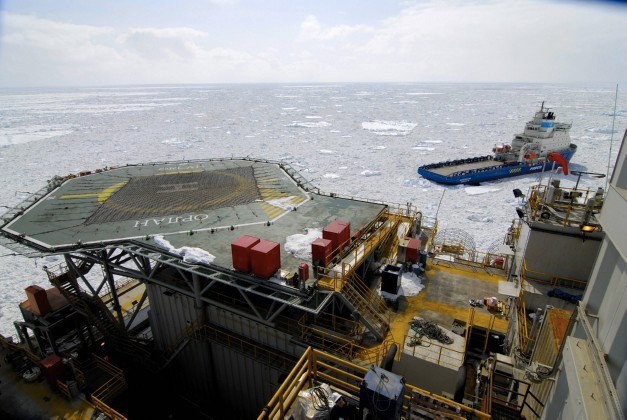Rosneft announces a big oil discovery in the Pechora Sea
The prospect, located in shallow, icy waters, contains as estimated 82 million tons of oil.

The Russian state-run oil company Rosneft has announced the discovery of an oil prospect estimated to contain 82 million tons of oil in the Medynsko-Varandeyskoye license, an area in the Pechora Sea where the company previously drilled several exploration wells and found oil.
“During the test, a free flow of oil was obtained with a maximum flow rate of 220 cubic meters a day,” Rosneft said in a statement last Wednesday.
While many oil analysts speculate that Russia lacks the needed technology to develop offshore Arctic fields, Rosneft boss Igor Sechin assures the country has what it takes.
“We have all needed competencies, knowledge and experience, and in these kinds of projects 98 percent of technology is produced in Russia,” Sechin said in June when talking at the St. Petersburg Economical Forum about the plans for the Vostok Oil project, another Arctic cluster of onshore and planned offshore fields under development east of the Taimyr Peninsula.
He added that the project includes exports through the Northern Sea Route, and that there consequently “will be no dependency of foreign companies and logistics chains.”
The Pechora Sea is in the eastern Barents Sea, waters that normally are ice-covered mid-winter and early spring. The sea is shallow and in this drilling area, only 10-19 meters.
The license area is close to Gazpromneft’s Prirazlomnoye field, the only operative offshore oil-producing platform in the European part of the Russian Arctic.
Onshore in the Nenets Autonomous Okrug there are several oil fields producing oil shipped to markets via a subsea pipeline to the offshore Varandey terminal operated by Lukoil. From there, ice-strengthened tankers bring the oil to Murmansk for reloading to larger tankers sailing to world markets.
As Europe is in the process of banning all oil imports from Russia, markets in Asia could see an opportunity to buy Arctic oil shipped eastbound via the Northern Sea Route.